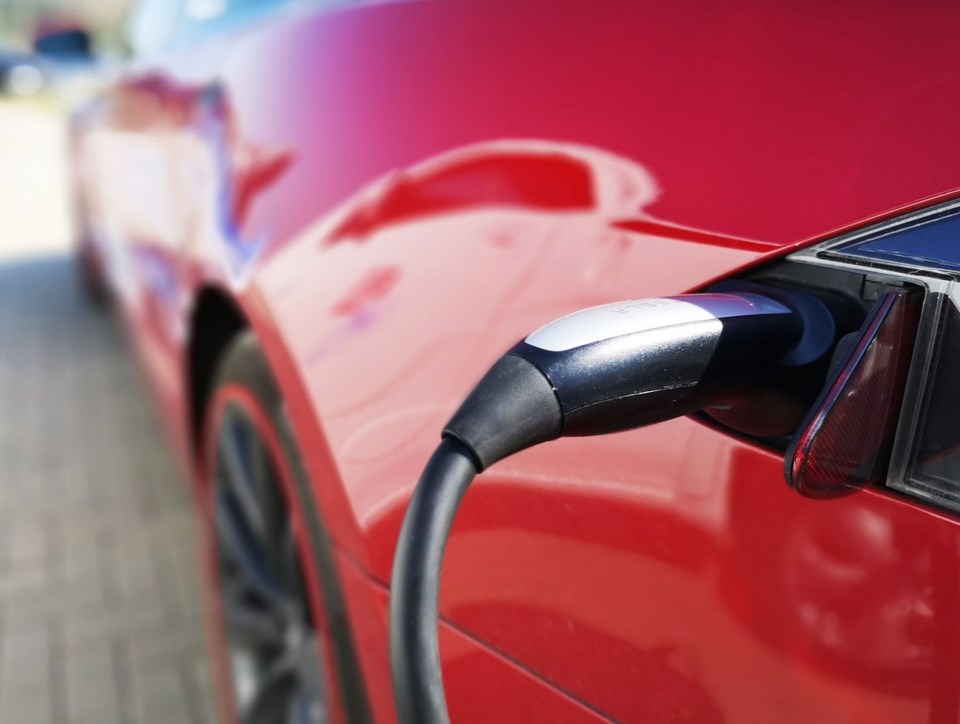Do your homework.
That's the advice of a contractor who has seen a huge jump in interest from Tri-City homeowners seeking to install a Level Two 240V charger to power their electric vehicle (EV).
"The most important thing you can do is just be informed," said Craig Dowdall of Universal Electrical Services, whose company does electrical contracting in the Tri-Cities, including installing EV chargers in single family homes, condos and commercial buildings.
"Don’t necessarily trust what you can Google, speak to an electrical contractor, most of us are knowledgeable about this information and what you require," he said.
EV charger rebate is $350 for single B.C. family homes
Dowdall says people are sometimes surprised to learn that they don't have the service capacity in their electrical panel for an EV charger and getting one installed will cost more than the $350 rebate.
Funded by the B.C. government's ministry of energy, mines and low carbon innovation, and with financial support from Ottawa, BC Hydro administers the CleanBC Go Electric electric vehicle charger rebate program.
The program provides rebates for the purchase and installation of chargers and infrastructure to get homes and workplaces across B.C. ready for EVs.
Recently, the rebate for condos and work places was increased to 75 per cent of the cost, up to $5,000.
That coverage is up from 50 per cent, according to an announcement made by the province on May 18.
Using the same voltage as a clothes dryer, an hour charge with a Level Two charger will give an EV roughly 30 km of range, according to the ministry.
However, while the rebate for condos and workplaces increased, the amount available for single family home owners has not changed, said Dowdall.
That amount will cover the cost of permits, depending on the extent of work that needs to be done to put in a home EV charger, he explained.
But while the rebate is small, it hasn't deterred people from putting in home chargers.
More people calling about EV chargers in homes, condos, malls
Dowdall said he's seen an increase in the number of calls from home owners, as well as condo buildings and commercial property owners, such as strip malls, about the cost and practicality of putting in electric chargers.
For homeowners, costs can vary depending on the current service and complexities of putting in a charger, and, while Dowdall wouldn't specify an average cost, said for most people getting a Level Two EV charger is worth the money.
"You can have your vehicle sit over night and get a full charge," Dowdall said.
"Most people do top up charging, you don’t drain the battery; it's a way of keeping it at an optimal level."
Adding a Level Two EV charger is equivalent of putting in a new appliance, such as a dryer or air conditioner, so the electrical panel needs to have capacity and may need to be upgraded.
However, there are other options, such as a demand charge controller, that turns off the EV charging when there is too much load on the system and turns it back on when the demand is reduced.
He advises people to get a quote from an electrician to figure out the best option. Once permits are obtained, it's just a matter of setting up a date to do the work.
BC Hydro also has a list of things to consider on its website before installing an EV charger, including space, electrical service needs, whether the charger will be indoors and outdoors and available rebates.
Dowdall says most homeowners like to put EV chargers in their garage. One recent homeowner required an update to their panel because they had just purchased the home and wanted an EV charger, a hot tub and an air conditioning system.
"They were able to work the cost into their mortgage and had planned ahead."
But everyone is different, with unique needs and budgets.
"I’ve seen both scenarios, I’ve seen scenarios where people have inquired with us before they buy and need to know their total investment in the car, and others who buy the vehicle and say, 'Do what ever needs to be done.'"





